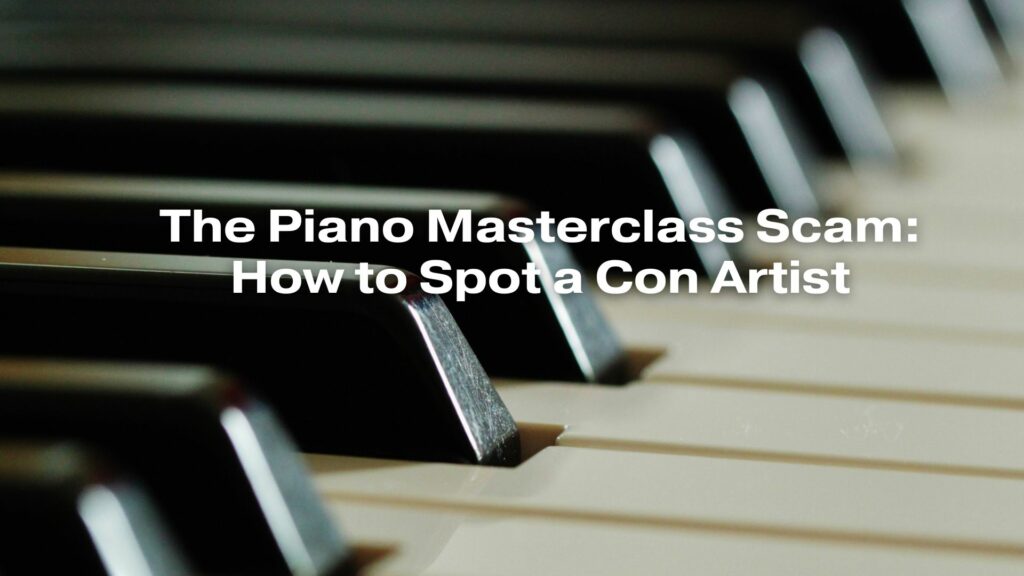The world of music is a beautiful realm filled with genuine opportunities for learning and growth. However, just like any field, it’s not immune to individuals who seek to exploit the dreams and aspirations of aspiring musicians. The piano masterclass scam is one such example, where con artists attempt to lure unsuspecting pianists into fraudulent schemes. In this article, we will explore the piano masterclass scam and provide you with the tools to spot and avoid these con artists.
Understanding the Piano Masterclass Scam
The piano masterclass scam typically involves an individual or organization claiming to offer exclusive, high-level piano masterclasses, often featuring a well-known pianist or educator. The fraudsters use various tactics to make their scam appear convincing:
1. Impersonation: Scammers may impersonate famous pianists, pedagogues, or institutions, using their names or logos without permission to create an air of legitimacy.
2. Unrealistic Promises: Con artists make bold promises, such as guaranteed success, rapid skill development, or exclusive access to a secret technique, to entice potential victims.
3. Limited-Time Offers: The scam often includes a sense of urgency, urging potential victims to sign up quickly before the “exclusive opportunity” expires.
4. High Registration Fees: Scammers charge exorbitant fees for these “masterclasses,” often far beyond what legitimate piano education would cost.
5. Lack of Credentials: The scammers may have little to no verifiable credentials, and their websites or promotional materials may lack clear information about their background.
6. Pressure Tactics: Victims are often subjected to high-pressure sales tactics, making them feel like they need to act quickly to secure their spot.
How to Spot a Piano Masterclass Scam
Now that you know the common characteristics of a piano masterclass scam, here are some strategies to help you identify and avoid falling victim to such cons:
1. Verify Credentials: Research the instructor’s or organization’s credentials. Legitimate educators and institutions will have a well-documented track record and presence in the music world.
2. Beware of Unrealistic Promises: Be cautious if the offer seems too good to be true. Remember that becoming a proficient pianist takes time, dedication, and practice.
3. Check for Impersonation: Look for signs of impersonation, such as inconsistent branding, fake endorsements, or unusual domain names.
4. Avoid High-Pressure Sales Tactics: Scammers often create a sense of urgency to make you act without thinking. Take your time to evaluate the opportunity carefully.
5. Seek Reviews and Recommendations: Check for reviews or recommendations from credible sources, or seek advice from fellow musicians and teachers.
6. Trust Your Instincts: If something doesn’t feel right, trust your instincts. If you have doubts about an opportunity, it’s best to walk away.
Legitimate Piano Learning Opportunities
Fortunately, there are numerous legitimate piano learning opportunities available. To further ensure your safety and progress as a pianist, consider the following:
- Academic Institutions: Many reputable universities and conservatories offer online music programs.
- Established Music Schools: Look for well-known music schools that offer online lessons and masterclasses.
- Independent Instructors: Seek recommendations for piano instructors with proven track records and experience.
- Online Learning Platforms: Trustworthy platforms like Coursera, Udemy, and others offer a wide range of piano courses from credible educators.
In conclusion, while the world of music offers countless opportunities for growth and learning, it’s crucial to remain vigilant and cautious when encountering piano masterclass offers that seem too good to be true. By understanding the tactics used by con artists, researching the legitimacy of instructors and organizations, and seeking recommendations from reputable sources, you can protect yourself from falling victim to the piano masterclass scam and continue your musical journey with confidence and authenticity.


